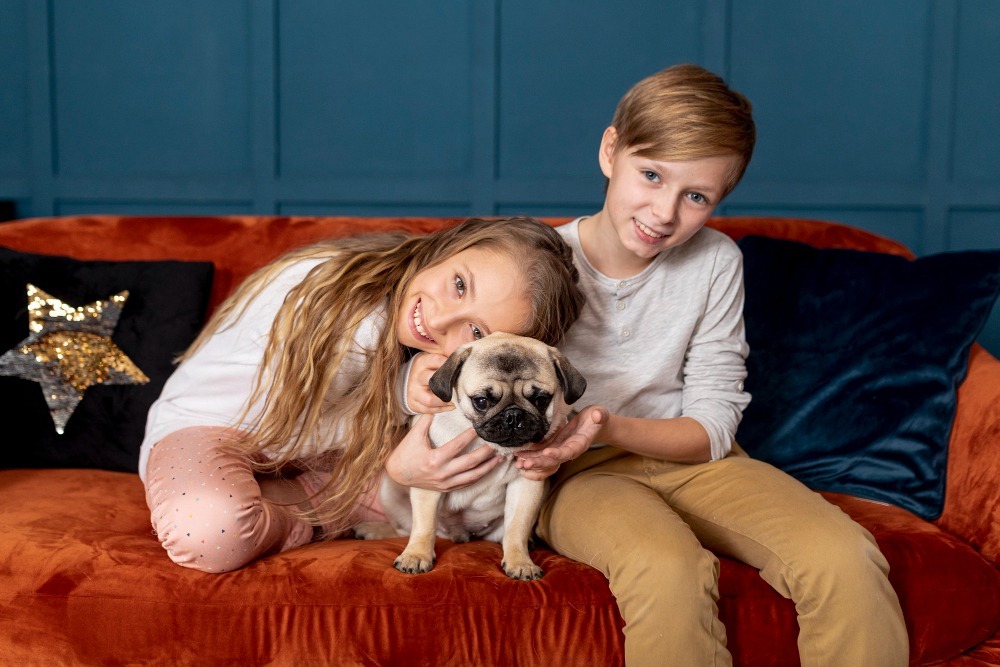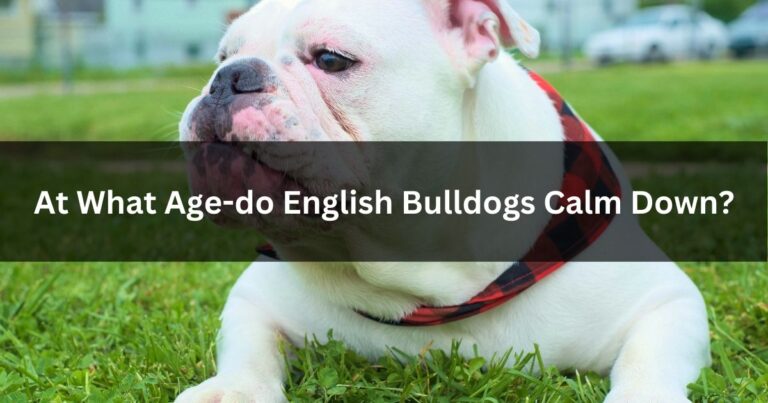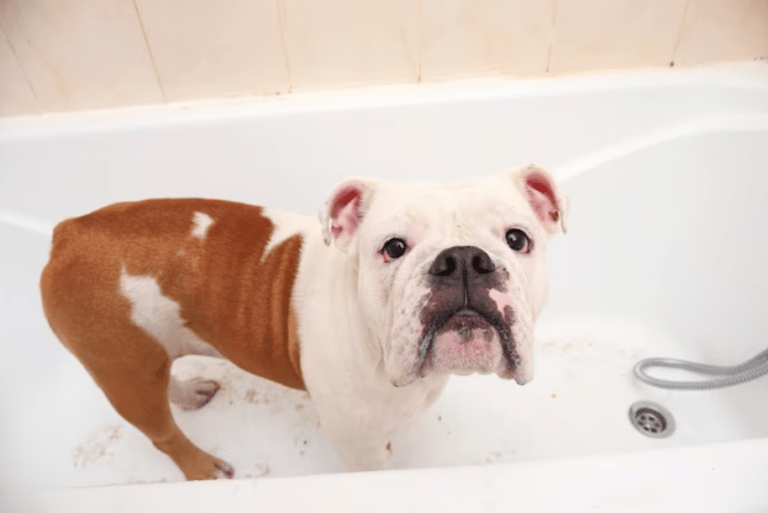Are Bulldogs Good With Kids?
If you’re a parent or guardian, you know how important it is to find a pet that will fit seamlessly into your family dynamic. And when it comes to choosing a four-legged friend, Bulldog breeds often come to mind. But are Bulldogs good with kids?
Whether you have toddlers who love rough-and-tumble play or older children seeking a loyal and gentle companion, there’s a Bulldog out there that can perfectly match your family’s unique needs. So let’s dive in and explore which Bulldog breed might be the best fit for your little ones.
Bulldogs With Kids
Bulldogs have gained a reputation for being excellent family pets, and for good reason. These lovable canines are known for their gentle and affectionate nature, making them great companions for kids of all ages. Whether it’s cuddling up on the couch or joining in on playtime adventures, Bulldogs are always eager to be part of your little one’s life.
One of the key reasons why Bulldogs make fantastic companions for children is their patience. They tend to have a calm and tolerant demeanor, which means they’re less likely to get agitated or easily overwhelmed by kids’ energy levels. This makes them ideal playmates who can handle the excitement of having young ones around.
It’s important to note that each Bulldog has its personality traits, so it’s crucial to choose a breed that aligns with your family dynamics and lifestyle. Some Bulldog breeds may be more energetic than others or better suited for households with older children who understand how to interact respectfully with animals.
If you’re looking for a furry friend who will adore your kids as much as they’ll adore him or her, look no further than a Bulldog! Their loving nature combined with their natural affinity for children make them an ideal choice when searching for the perfect family pet.

Which Bulldog Is Best For Kids?
When it comes to choosing the best bulldog breed for kids, there are a few factors to consider. One of the most important things to keep in mind is the temperament of the dog. Bulldogs are generally known for their gentle and calm nature, making them a great choice for families with children.
One popular option is the English Bulldog. These dogs have a reputation for being loyal and good-natured, which makes them excellent companions for kids. They tend to be patient and tolerant, even in situations that may be overwhelming or stressful.
Regardless of which bulldog breed you choose, it’s essential to remember that individual dogs will have their unique personalities and temperaments. It’s always a good idea to spend time getting to know a specific dog before bringing them into your home.
Both English Bulldogs and French Bulldogs can make wonderful companions for kids due to their friendly nature and ability to adapt well within a family environment.
Can Bulldogs Become Aggressive?
Can bulldogs become aggressive? This is a question that many potential dog owners, especially those with young children, may have. While every dog has its unique personality, it is important to understand the general temperament of bulldogs when considering them as family pets.
Bulldogs are known for their gentle and loving nature, making them popular for families with kids. They are typically patient and tolerant of children’s antics and can handle rough play without getting agitated. However, like any other breed, there may be individual bulldogs who display aggressive behavior.
It is important to note that aggression in bulldogs can often be attributed to factors such as improper socialization or lack of training rather than inherent breed traits. Early socialization and obedience training are crucial in preventing or addressing any signs of aggression. Positive reinforcement techniques should always be used when disciplining a bulldog to ensure it responds well.
How Do You Discipline A Bulldog?
When it comes to disciplining a Bulldog, it’s important to remember that positive reinforcement is critical. Bulldogs are known for their sensitive nature, so harsh or aggressive discipline methods should be avoided. Instead, focus on rewarding good behavior and redirecting unwanted behavior.
One effective method of discipline is using treats and praise to reward your Bulldog when they exhibit desired behaviors. For example, if your Bulldog sits calmly instead of jumping up on someone, give them a treat and lots of verbal praise. This reinforces the idea that sitting calmly gets them rewarded.
If your Bulldog engages in undesirable behavior such as chewing furniture or barking excessively, try redirecting their attention to an appropriate toy or activity. Bulldogs have a strong desire to please their owners, so providing alternative outlets for their energy can help discourage negative behavior.
Consistency is also crucial when disciplining Bulldogs. Establish clear rules and boundaries from the beginning and enforce them consistently, without exception. By being consistent with your expectations, you’re helping your Bulldog understand what acceptable behavior is.
It’s important to note that physical punishment should never be used as a form of discipline with Bulldogs or any other breed of dog. Not only does this harm the bond between you and your pet, but it can also lead to aggression or fear-based responses in the future.
By using positive reinforcement techniques combined with consistency and patience, you can effectively discipline a Bulldog while still maintaining a loving relationship based on trust and respect
How To Raise A Bulldog Around Young Children?
When it comes to raising a bulldog around young children, it’s important to establish a safe and positive environment for both the dog and the kids. Bulldogs are generally known for their friendly and gentle nature, making them great companions for little ones. However, like any breed, proper training and socialization are key.
First and foremost, teach your children how to properly interact with dogs. They should understand the importance of being gentle and respectful toward their furry friend. Supervision is crucial when they’re together to prevent any rough play or accidental harm.
Creating a consistent routine is also essential when raising a bulldog around young children. Dogs thrive on structure, so establish regular feeding times, walks, play sessions, and rest periods throughout the day. This will help your pup feel secure and balanced in their interactions with kids.
Positive reinforcement training methods work best with bulldogs. Use treats or praise whenever your dog behaves well around children or follows commands correctly. This will reinforce good behavior while building trust between your bulldog and the little ones.
Provide your bulldog with plenty of physical exercise to keep them happy and healthy. Engage in activities that both dogs and kids can enjoy together, such as playing fetch or going on family walks.
By following these guidelines for raising a bulldog around young children, you’ll be fostering an environment where everyone feels comfortable and safe – promoting a harmonious relationship between your furry buddy and your little humans!
How Do You Play With A Bulldog?
When it comes to playtime, Bulldogs can be a joy to have around. Their friendly and easy-going nature makes them great companions for children of all ages. Here are some tips on how to play with your Bulldog:
1. Choose the right toys: Bulldogs have powerful jaws and love to chew, so make sure you provide them with sturdy toys that are specifically designed for their breed.
2. Engage in interactive games: Bulldogs enjoy games that involve interaction with their owners, such as fetch or tug-of-war. These activities not only keep them physically active but also strengthen the bond between you and your furry friend.
3. Provide mental stimulation: Bulldogs are intelligent dogs and need mental stimulation to prevent boredom. Puzzle toys or treat-dispensing toys can help keep their minds sharp while providing entertainment.
4. Keep it gentle: While Bulldogs may have a strong build, they are quite sensitive creatures. Avoid rough play or pulling on their skin folds, as this can cause discomfort or injury.
5. Supervise play sessions: Always supervise interactions between young children and your Bulldog to ensure everyone is safe and having fun. Teach kids how to properly approach and handle the dog.
So if you’re considering adding a four-legged family member who will get along well with kids, rest assured that Bulldogs can make wonderful companions for children of all ages.
In conclusion (without explicitly stating “in conclusion”), bulldogs are generally good with kids due to their friendly temperament and patience towards little ones’ antics. However, like any dog breed, proper training and socialization from an early age are crucial in ensuring a harmonious relationship between the dog and the children. By following these guidelines on choosing the right Bulldog.







